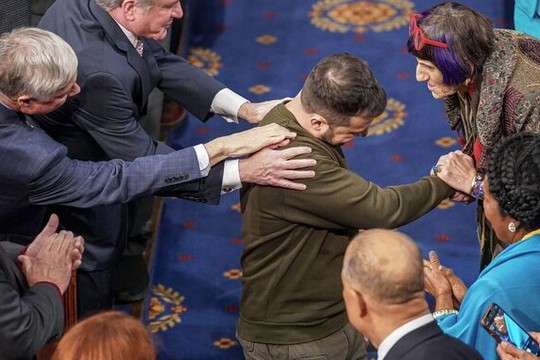A mess in US Congress. Zelensky in the middle of congressmen hype, but did they want to fight with Russia?
Photo: Express.co.uk
As part of the discussions of strategy for the next year, some Western officials are more seriously gaming out how a negotiated end to the conflict and an off-ramp could take shape, according to people familiar with the matter who asked for anonymity to discuss private deliberations, notes Bloomberg.
The people made clear that any decision to negotiate would be for Kyiv to make and that nobody is pressuring Volodomyr Zelenskiy into talks. With no sign that Russia has scaled back its objectives, the prospect of real negotiations still remains distant, they said.
But as the war heads toward another winter, there’s little sign of breakthrough on the battlefield. That’s prompting some allied officials to start exploring ways in which diplomacy could break the deadlock.
Though Kyiv’s surprise incursion into the Kursk region of Russia upended the perception the war had settled into a stalemate that played to the Kremlin’s strengths, there’s little immediate prospect of Kyiv dislodging Russian troops from all the land they occupy and some allies remain unclear about the operation’s longer-term strategic purpose. Moscow missiles have destroyed large parts of Ukraine’s energy infrastructure, raising fears about how the country will weather this winter.
A negotiation to end the fighting would have to resolve a key conundrum: how to ensure that Ukraine allies won’t be dragged into a direct conflict with the Kremlin. The latter concern is a major reason why several allies have so far been cautious about allowing the use of the long-range weapons they provide in Russia and the possibility of Ukraine becoming part of NATO – with its security guarantee – anytime soon.
Some allies believe that the time between the November US election and next January’s presidential inauguration may provide a window of opportunity during which the outgoing Biden administration may have more political leeway to make a deal. Continued military and financial support for Ukraine could face uncertainty with a change of administration in the US and the rise of far-right forces in Europe.
Should he win the election, Trump has also suggested he would seek a deal in that time, without providing details. JD Vance, his running mate, recently said the former president’s plan could include Russia retaining what it has taken and a demilitarized zone established along current battle lines.
German Chancellor Olaf Scholz, who is among those to have resisted providing Ukraine with longer-range missiles, told broadcaster ZDF that now was the moment to discuss how to get out of the war faster.
Allies’ immediate concern is to help Ukraine restore some of its energy capacity ahead of winter and fend off Russian advances around the strategic town of Pokrovsk in the Donetsk region.
Still, discussions over the medium-term strategy are also fueling disagreements within some Western governments, officials said.
One camp is more persuaded by Putin’s threats of escalation if allies allow Ukraine to use the weapons they provide deep inside Russia and more likely to favor a push toward a diplomatic resolution. Other allies oppose negotiations anytime soon and want to increase the supply of arms to Ukraine.
That split over potential talks points to a long-standing frustration among some officials, and many in Ukraine, over the allies’ reluctance to give Zelenskiy more weaponry to deploy against Russian forces.
read more in our Telegram-channel https://t.me/The_International_Affairs

 10:18 26.09.2024 •
10:18 26.09.2024 •























